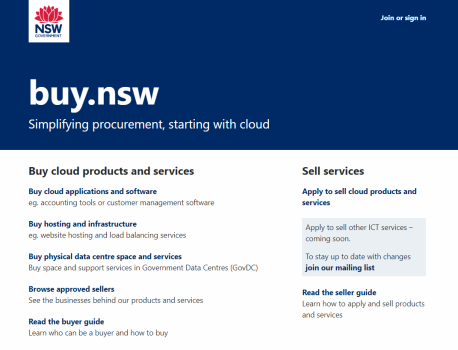By Julian Bajkowski
The New South Wales government has added to a downpour of public sector cloud computing policy announcements in the past week, revealing the state’s departments and agencies will now be compelled to put the popular technology into the mix for assessment when making technology purchases.
Announced by Minister for Finance and Services Andrew Constance on Monday, the well-anticipated move delivers on a pledge by Premier Barry O’Farrell and since removed Finance Minister Greg Pearce to put the state’s $2 billion a year worth of technology purchasing on a more efficient footing by allowing agencies to share common infrastructure where possible and practicable.
The new policy ropes in “all NSW Government Departments, Statutory Bodies and Shared Service Providers” but not State Owned Corporations that include energy and water utilities, ports operators and state forests.
However government corporations not under the cloud policy umbrella are still being encouraged to voluntarily adopt the edict.
While any targeted savings to be achieved by the shift to the common computing infrastructure model are yet to be outlined, cost reductions through consolidation are typically more than 20 per cent and can be as high as 80 per cent because of the lift in capacity utilisation.
The technology also allows agencies to upgrade and patch software far more quickly and cheaply because fixes are centralised rather than being shunted out to individual client machines and servers.
“Cloud is the future of ICT service delivery and this policy puts NSW at the forefront of the digital economy, giving public sector agencies the tools and information they need to adopt cloud-based solutions,” Mr Constance said.
Buzzwords aside, the muscle behind the new policy is a new set of procurement governance guidelines that spell out essential considerations around privacy and security when evaluating cloud provider offerings.
The bugbear for many public sector buyers has been compliance with privacy and data disclosure and sharing regulations that were often written well before cloud computing was popularised.
To address this issue and push back against a predictable rear-guard campaign by more traditional and legacy software providers, clarified definitions how government data can be stored have been issued.
A key definition for cloud buyers is around the handling of personal information (collection, storage, access, use and disclosure) that is covered by the Privacy and Personal Information Protection Act 1998 and the Health Records and Information Privacy Act 2002.
The issue of ‘disclosure’ of personal information had been a sticking point because the use of remote or common facilities used by cloud offerings potentially created a breach because the data was on the move.
“If an agency shares or transfers personal information with a contracted cloud service provider and the cloud service provider simply holds the data and acts according to the instructions of the agency, then disclosure will not be considered to have occurred,” the NSW cloud policy states.
“If the cloud service provider uses the data provided for its own purposes, this may be unauthorised access, use, modification or disclosure.”
That definition will also go some way to clearing a path for local governments to piggy back on the state government’s cloud policy to realise their own savings.
A significant data protection issue for local governments is that they are typically the custodians of substantial amounts of sometimes personal information on individuals and businesses because they deliver service and collect revenue.
At the same time, because many councils are smaller than state government agencies they are yet to realise the aggregated buying power for technology that has been harnessed by state agencies.
Efficiency and operational cost-reduction remains a burning issue for many NSW local governments because the O’Farrell government has indicated it could consider forcing mergers of councils to generate savings, a move that is deeply unpopular among councillors and mayors.
Comment below to have your say on this story.
If you have a news story or tip-off, get in touch at editorial@governmentnews.com.au.
Sign up to the Government News newsletter
Most read
Scathing report finds little has changed at PwC
Qld council welcomes progress on massive battery system
Inquiry to consider how federal govt can address councils’ sustainability issues
‘Local’ procurement turns out not to be so local, committee hears
Another report finds local government falling down on cyber security

